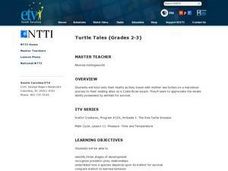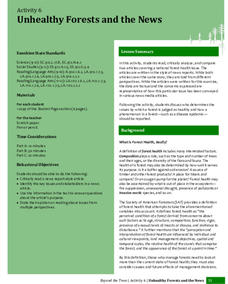Curated OER
Turtle Tales
Learners watch videos and fill out worksheets about the turtles and their journey to the Costa Rican beach. In this turtles lesson plan, students learn and discuss survival, predator and prey, and stages of development.
University of Florida
Unhealthy Forests and the News
Everyone knows a tree makes a sound when it falls, but what do we know about dying trees? Class members learn background information about Laurel wilt disease from a teacher-led presentation. Team members work with partners to read and...
Curated OER
What is a Dry Forest?
Students explore the importance of the dry forest. For this science lesson, students discuss the history of dry forests and changes that have occurred due to human interaction. Students create a map showing the historical range of the...
Curated OER
Scales, Scutes, and Skins
Students identify the various adaptations of reptiles and amphibians. After distinguishing between reptiles and amphibians, students discuss the ways in which their adaptations aid in their survival. They participate in a hands on...
Curated OER
Collecting and Pressing Plants
Students engage in a lesson that is concerned with the study of native plants and classifying them according to a kind. They press them into a journal while identifying them according to species. Students compile the samples into a...
Curated OER
Desinging and Using a Dichotomous Key
Students are examine the purpose of dichotomous keys. In groups, they design their own in order to describe the characteristics of plants and weeds native to California. To end the lesson, they define new terminology associated with the...
Curated OER
What Role Do Forest Play in Continuing or Renewing Our Planet's Resources?
Learners explore the interaction between the forest and wildlife. In this forestry lesson, students collect data about forest ecosystems, species of trees, photosynthesis, and interaction of organisms. They prepare a lab activity to...
Curated OER
Marine Protected Areas
Students design a research project about a Marine Protected Area they chose. In this marine biology lesson, students gather fish count and catch data then graph them. They create an information poster about their findings.
Curated OER
Cockroaches
Students listen to a lecture on cockroaches. They work in pairs to design a cockroach trap and attempt to trap a specimen. They complete various other cockroach-related activities.
Curated OER
Water is Life
Krill is a very small ocean animal that is key to keeping the ocean ecosystem going. The class reviews food webs and chains, learns about the importance of krill, discusses krill anatomy, builds a model of a krill, and then has a...
Curated OER
Identifying Quincy's Birds
Students compare a variety or bird characteristics. They identify and classify birds within their local area. Students investigate how to examine and scrutinize differences in features of organisms and understand variation in the...
Curated OER
Why Are The Shore Birds Dying?
Learners engage in a field study of birds and how they are in danger harm due to environmental factors. They list different possible causes in a prediction activity. The observations are done while writing up data and connecting it to a...
Curated OER
LEAF (Learning Exercises and Activities in the Forest
Students observe populations and determine the functions (e.g., decomposers, producers, consumers) they serve in an ecosystem. They investigate the energy flow ecosystems. Students investigate factors (.g., Resources, light, water) that...
Curated OER
Population Patterns
Students study patterns of population growth in an ecosystem and why populations must remain in balance. They interpret basic population graphs and suggest scenarios about different population growth patterns in an ecosystem.
Curated OER
A Monument for Marine Conservation
Students explore the Northwestern Hawaiian Islands to discover what's there and pick up clues as to how people have both harmed and helped the native habitats. They study another protected area and see how to balance conservation efforts...
TED Talks
Ted: Ted Ed: The Threat of Invasive Species
Massive vines that blanket the southern United States, climbing high as they uproot trees and swallow buildings. A ravenous snake that is capable of devouring an alligator. Rabbit populations that eat themselves into starvation. These...
TED Talks
Ted: Ted Ed: Attack of the Killer Algae
As benign as it may look up close, the tiny seaweed Caulerpa taxifolia can wreak quite a bit of havoc on coastal ecosystems. This super algae is very adaptable; it also grows fast and spreads easily. Eric Noel Munoz gives the details of...
PBS
Pbs Learning Media: Saving Crystal River
Explore the effects that an invasive species can have on the environment. In this interactive lesson, students learn how Lyngbya, a destructive form of algae, is creating environmental problems for the plants and wildlife in the Crystal...
Environmental Education for Kids
Eek!: Teacher Resources: Identifying Alien Invaders
In this instructional activity, students will identify native and exotic plant and animal species through observation and research, and identify the effects of introduced species on ecosystems.
Environmental Education for Kids
Eek!: Teacher Resources: Invaders of the Forest [Pdf]
A 140-page teacher resource guide of lesson plans in environmental education for K-12. Students will learn how to distinguish between native, non-native, non-native invasive, and native invasive plants, and the impact invasive plants can...



















